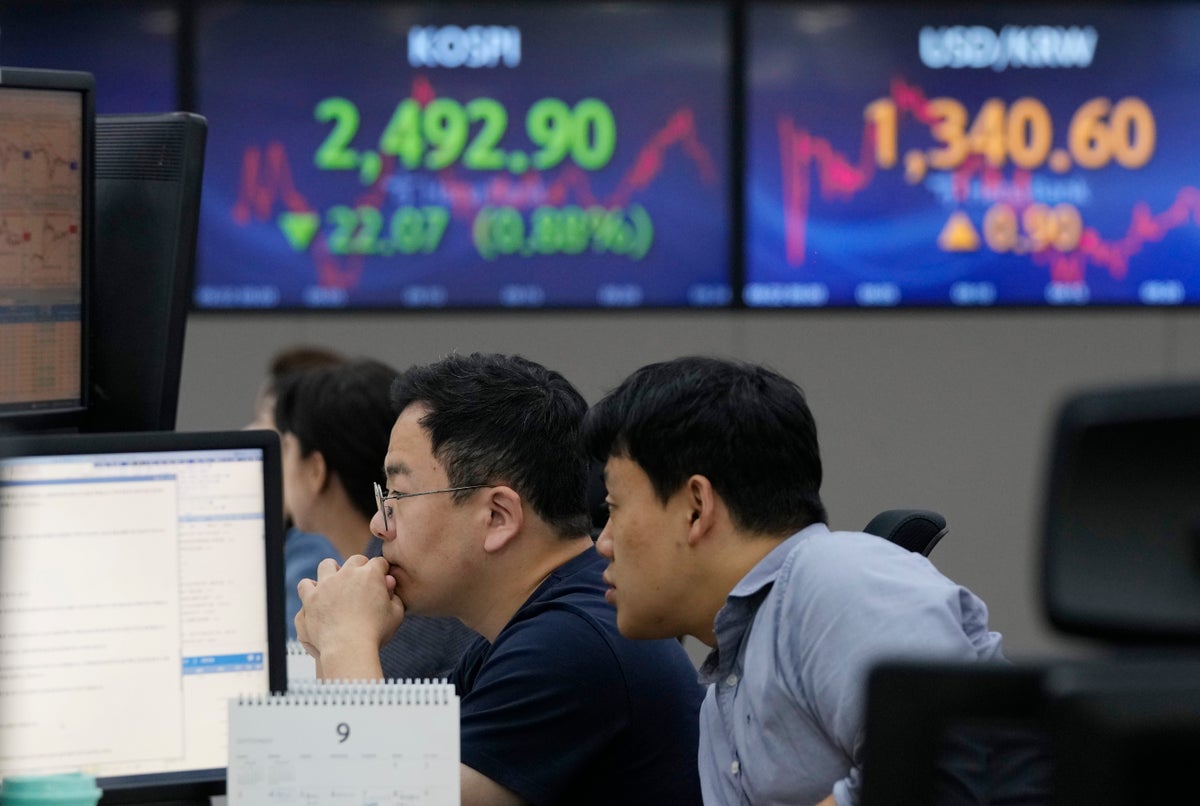
Asian shares were mixed on Friday after another slump on Wall Street driven by expectations that U.S. interest rates will stay high well into next year.
Hong Kong and Shanghai advanced while Tokyo, Seoul and Sydney declined. U.S. futures edged higher and oil prices rose.
Japan’s central bank kept its benchmark interest rate at minus 0.1%, as expected, but pledged flexibility in its policies.
“Japan's economy is likely to continue recovering moderately for the time being, supported by factors such as the materialization of pent-up demand” after the pandemic, the Bank of Japan said in a policy statement.
It forecast that even though inflation has surpassed its 2% target, it is likely to subside. That suggests the central bank is still wary of falling back into deflation, or chronically falling prices that can sap economic growth.
Tokyo's Nikkei 225 fell 0.2% to 32,501.59. In Seoul, the Kospi shed 0.2% to 2,510.27.
Hong Kong's Hang Seng gained 0.9% to 17,816.79 and the Shanghai Composite index climbed 0.8% to 3,110.15.
India's Sensex added 0.2% to 66,328.78.
Australia's S&P/ASX 200 slipped 0.2% to 7,049.20 even as the government reported a $14.2 billion budget surplus for the last fiscal year. It was the first time the nation’s books were balanced in 15 years, with officials citing low unemployment and high prices for the country’s commodities, including iron ore, coal and gas.
On Thursday, Wall Street fell sharply in an ugly day for stocks worldwide.
The S&P 500 lost 1.6% for its worst day since March, closing at 4,330.00. That followed a drop of 0.9% from Wednesday after the Federal Reserve indicated it may cut interest rates next year by just half of what it had earlier predicted. The Fed has already hiked its main interest rate to levels unseen since 2001, which helps slow inflation but at the cost of hurting investment prices.
The Dow Jones Industrial Average dropped 1.1% to 34,070.42, and the Nasdaq composite lost 1.8% to 13,223.98.
High-growth stocks are typically among the hardest hit by high rates, and Big Tech stocks took the brunt of the pain for a second straight day. Amazon fell 4.4%, Nvidia dropped 2.9% and Telsa lost 2.6%.
Cisco Systems also took a hit after it said it would buy Splunk, a cybersecurity company, for roughly $28 billion in cash. Cisco fell 3.9%, while Splunk jumped 20.8%.
On the winning side of Wall Street, FedEx rose 4.5% after it reported stronger profit for the latest quarter than analysts expected.
Stock prices tend to fall when rates rise because stocks are riskier investments. Why chance their big swings when Treasurys are paying higher interest.
A 10-year Treasury is offering a yield of 4.48%, up from 4.40% late Wednesday and from only 0.50% three years ago. It’s near its highest level since 2007.
The two-year Treasury yield, meanwhile, wavered following some mixed reports on the economy. It slipped to 5.14% from 5.17% late Wednesday after climbing earlier in the morning.
One report showed fewer U.S. workers applied for unemployment benefits last week than expected. It was the lowest number since January.
A solid labor market helps calm worries about a possible recession. But it may also give U.S. households fuel to keep spending, which could keep upward pressure on inflation. That in turn could give the Fed more reason to keep rates higher for longer.
However, a separate report showed manufacturing in the mid-Atlantic region is contracting by much more than expected. A third report showed sales of previously occupied U.S. homes were weaker last month than economists expected.
Manufacturing and the housing industry have felt the sting of higher interest rates in particular and have struggled more than the broad job market.
In other trading, U.S. benchmark crude oil gained 66 cents to $90.29 per barrel in electronic trading on the New York Mercantile Exchange. It lost 3 cents on Thursday.
Brent crude oil, the pricing basis for international trading, picked up 56 cents to $93.86 per barrel.
The U.S. dollar rose to 148.06 Japanese yen from 147.58 yen. The euro slipped to $1.0654 from $1.0661.







